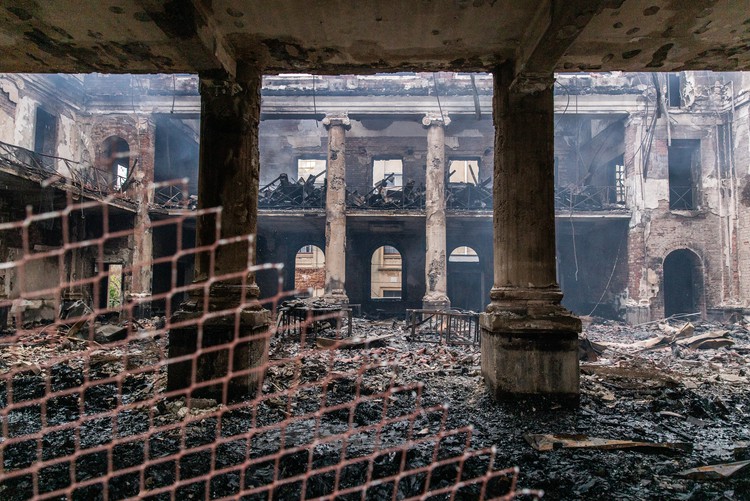
13 July 2022
The University of Cape Town’s Jagger Library, which housed thousands of theses, artworks, and precious documents, after it was gutted by a fire in April 2021. Archive photo: Ashraf Hendricks
The University of Cape Town’s Jagger Library, gutted by a fire that started on 18 April 2021, is being “reimagined”, but the funds necessary to rebuild the library, in whatever form that may be, have not yet been secured.
Jagger Library was arguably one of the most important institutions in the country. Its loss is one of the worst heritage disasters in recent African history.
An extensive public participation and “imagining” process is ongoing, but the insurance on the building has not been paid out pending legal action between the respective insurers of the University of Cape Town (UCT), South African National Parks (SANParks) and the City of Cape Town.
The Jagger Library building was home to UCT’s Special Collections, including one of the world’s most extensive collections of African books and films, and valuable archival collections documenting key parts of southern African history.
Sixteen months after the fire, things are moving slowly. Save for a temporary roof installed in August last year, which took two months, the Jagger building has not been touched.
UCT’s insurers have urged the university to take SANParks to court over an expired contract between SANParks and a contractor that was supposed to deploy helicopters to douse the fire. This legal action is ongoing.
UCT spokesperson Elijah Moholola told GroundUp that although the action is brought in the name of UCT, the legal action is essentially between the respective insurers of UCT, City of Cape Town, and SANParks.
Moholola said he could divulge no further information on the legal action, the insurance claims, or investigations into the fire, but referred GroundUp to a report on the fire by SANParks. In this report, Table Mountain National Park claims that the helicopter contractors responded appropriately and on time.
Among the archives are pamphlets from political and non-profit organisations, documenting key moments in South African history. Photo: Daniel Steyn
Executive Director of UCT Libraries Ujala Satgoor says that building the new Jagger Library will require significant funding, which is dependent on the insurance payout and additional fundraising by UCT.
In the interim, various people at UCT are using the time to conceive of the future of the Jagger Library. Before the fire, a process was started to develop a libraries masterplan. Satgoor says that the fire at Jagger has presented an opportunity to broaden the horizon of that project.
Worldwide, the traditional concept of a library is rapidly changing, says Satgoor. Libraries are being redefined with an emphasis placed on “intellectual experiences”. Future libraries will be more open and innovative spaces, conducive to learning in various ways.
While collecting and storing hard-copy books and documents will always be an important function of a library, Satgoor says, she imagines a future library complex at UCT that contains a “balance and blend of spaces”, offering an array of different services and experiences.
However, some members of the UCT community want the building to be restored to its original state. This could potentially be a simpler process, particularly in terms of dealing with heritage authorities. The Jagger Library is a provincial heritage site.
But the debate is also political. In 2012, the Reading Room was restored to its original state, with additions built in the 1960s and 1970s stripped away. But UCT has changed since then. “We all know that Fees Must Fall shook the foundations of higher education as we know it,” Satgoor says.
She says that new questions have emerged about how to make education and learning more inclusive for young people from diverse backgrounds. What to do with the Jagger Library is connected to the ongoing redefining of UCT as a contemporary African university.
UCT’s landscape architect and heritage practitioner David Gibbs says that a reimagined Jagger Library is compatible with a cultural view of heritage as always moving forward and changing.
Both political and practical considerations are being mulled over. A name change is on the cards and debates around how to re-appropriate UCT’s colonial architecture are ongoing.
Meanwhile, Gibbs says there is also an opportunity to improve the flow and aesthetics of the plaza space around Jagger. The building itself is not ideally suited for storing sensitive archival material, he says, so the future usage of the library is also in question.
Conservation work on the Herbert Baker collection is underway. Photo: Daniel Steyn
The UCT Futures ThinkTank, established in 2018 by Vice-Chancellor Mamokgethi Phakeng, has just wrapped up an “imagining” process to help conceptualise the future of the Jagger Library.
“Normally when processes like this have happened at UCT, they were insular and closed-door. The thinking was to open up the process to the larger community,” says Dr Heeten Bhagat, project manager for the Jagger Library participation process.
Bhagat has been facilitating workshops with UCT staff and students, school students, and members of the public. These workshops, he says, have generated interesting information about people’s aspirations for the Jagger Library.
Bhagat says that some of the consultations were more effective than others, but overall it has been a positive process.
“It taught us a lot about what is possible and who is interested, and we learnt valuable lessons about the next time something like this happens,” he says.
Satgoor says she is excited to see what comes out of the ThinkTank’s imagining process, as it may also inform the broader Libraries Masterplan.